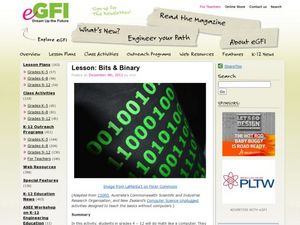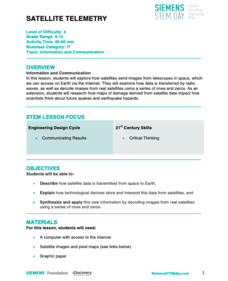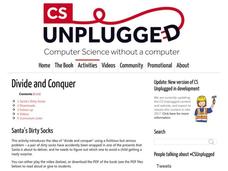Institute of Electrical and Electronics Engineers
Binary Basics
Back to the (binary) basics. The resource provides a simple overview of binary code and gives two different activities to introduce it to elementary and middle school learners. Classmates write and decode messages to each other in binary...
Code.org
Sending Binary Messages
Pairs build a device that will be able to send a binary message. They then update their device to allow it to send four possible messages before upping the ante to eight. The provided self-assessment rubric comes with reflection...
TryEngineering
Give Binary a Try!
Digital, analog, and now binary clocks? The lesson teaches individuals how to interpret binary code. They use an online software program to read binary clocks.
Computer Science Unplugged
Codes in a Song—Modems
Let's listen to some codes. To understand how a modem sends binary numbers over a phone line, class member listen to the codes included in the provided mp3 files, translates the tones to binary numbers and then convert the...
TryEngineering
Give Binary a Try!
Students apply binary code in software applications for computer engineers. For this binary code lesson, students read about binary code and its applications to computer engineers. They download software and read an online binary clock....
Code.org
Encoding Color Images
Color me green. The fourth lesson in a unit of 15 introduces the class to color images and how to encode color images using binary code and hexadecimal numbers — and they will quickly notice that it is easier to code the...
eGFI
Bits & Binary
Youngsters love to write on their hands, and in this fabulous activity they are actually asked to. Using numbers written on the tips of their fingers, they will learn how the binary number system works. This hands-on activity is a...
Curated OER
Binary Coding
Students identify different uses and forms of coding information, such as memory chips, discuss and create list of everyday items in which memory devices are used, watch video, play Bits and Bytes Game, and use binary code to encode and...
Code.org
Binary Numbers
All you need is a zero and a one. Build pupils' understanding of binary values and number systems to gain familiarity with binary numbers. Using a hands-on activity and technology, scholars learn how the binary system works and its...
Code.org
Sending Binary Messages with the Internet Simulator
Show your class how to develop a protocol to solve a problem. Pupils then continue with working with binary messages but refine a protocol to assist with the distinction of individual bits by including a bit rate. Finally, the pairs...
Computer Science Unplugged
Count the Dots – Binary Numbers
Did you know you can send a message using only zeroes and ones? This interactive resource presents an introduction to binary numbers. Through code cards, pupils learn to convert binary numbers to decimal numbers.
Curated OER
Break the Code!
Seventh graders crack a code using binary numbers. In this technology lesson, 7th graders explain how binary codes can represent letters and numbers. They create their own code and exchange them with their classmates.
Code.org
Sending Numbers
Binary graphing ... bit by bit. Pairs work together to develop a protocol in order to send the points of a graph. One partner sends the points and the other receives them and tries to recreate the graph. The pupils use the rubric to...
Discovery Education
Satellite Telemetry
Satellites require rockets to launch, but it doesn't take a rocket scientist to understand them. Future engineers learn about how satellites send data to Earth and how to interpret satellite images. They see how radio waves play a role...
Computer Science Unplugged
Twenty Guesses—Information Theory
How do we determine how much information to include and what can be left out? By playing a game of 20 questions, the class generates the best strategies for finding a number. They then move on to guessing the next letter in a short...
Computer Science Unplugged
The Peruvian Coin Flip–Cryptographic Protocols
A digital flip. Introduce your classes to cryptographic protocols using and, or, and not gates. Groups create a complete circuit to convert a binary number into another one. This type of one-way function allows pupils to...
Curated OER
Coding History
Students study the topic of codes in Computer Science. They research it history, divisions in the field and its applications. The lesson also includes a brief overview of the information technology theory.
Code.org
Encoding and Sending Formatted Text
Introduce your class to encoding text. Pairs work together to create a protocol to send text prior to learning ASCII encoding. Groups then collaborate to send and translate ASCII codes creating a formatted text message.
Curated OER
Binary and Communication Systems
Students participate in an activity that introduces them to the concept of binary coding as a language. They decode messages using special boards that has its own code for different letters. They create new codes by rearranging wires...
TryEngineering
Data Representation: Millions of Colors
How many colors do you know? The lesson teaches scholars how digital devices use binary and hexadecimal representations to store colors. They learn how millions of colors are available on these devices.
Curated OER
Zeros and Ones
Students review counting, the number system and the decimal number system. They rotate through three stations, "How RAM Works, "Binary Numbers" and "Binary Letters." They complete three separate worksheets to check for complete...
Code.org
Encoding B and W Images
Imagine drawing with zeros and ones. The third lesson in a unit of 15 introduces the class to creating black and white images. Pairs get together to create an encoding scheme in order to make these images. They move on to a...
Code.org
Processing Arrays
Scholars use a playing card activity to help them develop a program to find the minimum value of a list. They learn to use for loops to write code that will process lists.
Computer Science Unplugged
Divide and Conquer—Santa’s Dirty Socks
The story "Santa's Dirty Socks" provides learners an example of a search algorithm that uses a divide and conquer system similar to a binary search algorithm. The included questions expand upon the concepts that follow the story.























